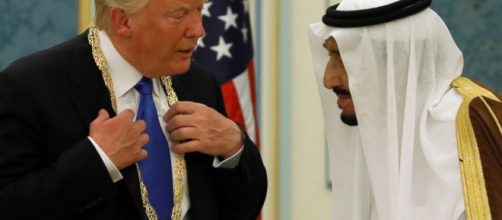Forget about his infamous travel ban on Muslims or his divisive tweets that castigate some Islamic groups; President Trump has always had some loyal friends in the Arab world. As a businessman, a great number of his lucrative business deals were secured in the Middle East, from Riyadh to Dubai. His business associates include well-known princes, sheiks, and emirs in the region.
Accolades
When he chose Saudi Arabia as his first stop on his inaugural foreign trip, it looked like he was set to galvanize some support from his erstwhile Arab friends, many of whom don't care about his Muslim travel ban, because they also practice similar travel restrictions against the citizens from the affected Muslim countries.
For his display of perceived friendship to the Arabs, Saudi Arabia awarded Trump the highest civilian honor for a non-Saudi.
Egyptian President, Abdel Fattah al-Sisi, praised him for making the U.S. regain Middle East influence through his "unique personality." In less than a year of his presidency, some leaders from the region have flocked to meet the President in Washington to further strengthen their alliances with him and the United States.
Divisive Politics
All these camaraderie gestures between Trump and some Middle Eastern leaders occurred because he played well to the divisive politics in the region. His fierce attacks and disavowals of Iran and his covert influence in the events that led to the isolation of Qatar further polarized the region that has always been divided along 'friends versus foes' ideology.
Jerusalem's risky move
However, his open declaration that Jerusalem, in its undivided entirety, remains the capital city of Israel, makes his Arab friends scramble for covers. It's like someone who has been drinking some good wine, but all of a sudden finds his/her throat clogged with a bottle stopper! That's why there have been feeble protests from some of the Middle East leaders despite the daily, dangerous demonstrations in Gaza and in other Muslim countries.
Some unforeseeable fallouts
Then the President took another unexpected decision that will surely get political historians/theorists busy for ages to come as they attempt to decode his leadership style.
He recently announced the suspension of military aids to Pakistan and threatened to stop U.S.
financial assistance to the Palestines and several other countries (some of which are in the Middle East) that voted against the United States on the floor of UN Security Council.
Pakistan has been U.S. strategic partner in its fight against the hardline terrorists in Afghanistan and the remote Pakistani villages. With this lukewarm relationship with Pakistan, who knows how this current happening will affect the dedication and effectiveness of the U.S. troops fighting thousands of miles away from home to promote global peace once Pakistan stops providing them the necessary intelligence and military assistance?


